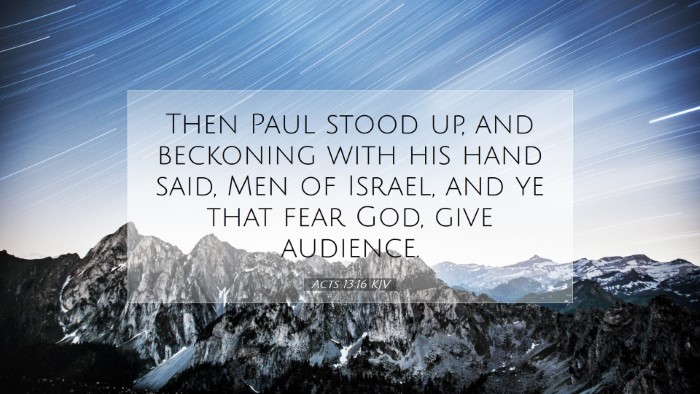Bible Commentary on Acts 13:16
Verse Context: Acts 13:16 states, "Then Paul stood up, and motioning with his hand said: 'Men of Israel, and you who fear God, listen.' This verse marks a pivotal moment in the apostolic mission as Paul addresses both the Jewish people and Gentile God-fearers in the synagogue at Pisidian Antioch.
Introduction
The significance of Paul’s address in Acts 13:16 cannot be overstated. It serves as an initial template for the early Christian preaching. Paul’s specific audience reveals the inclusivity of the Gospel message as well as its roots in the Jewish tradition.
Overview of Commentaries
In the exploration of Acts 13:16, we draw from various public domain commentaries, particularly focusing on insights from Matthew Henry, Albert Barnes, and Adam Clarke. Each of these scholars sheds light on the implications of Paul’s call to attention within the broader context of his message and mission.
Analysis of Paul’s Address
1. The Importance of Audience:
- Matthew Henry: Highlights that Paul directly addresses both Jews and Gentiles, indicating the communal nature of worship and the necessity of sharing the Gospel with all present. This inclusivity is foundational for understanding the inception of the Church’s mission outside of Jewish boundaries.
- Albert Barnes: Notes that the phrase "Men of Israel, and you who fear God" indicates a distinction made by Paul. He respects the traditions of the Jewish people while simultaneously acknowledging the Gentiles who are seeking God, thus fostering unity among diverse believers.
- Adam Clarke: Points out the cultural significance of Paul’s greeting, suggesting it was a way to garner attention and establish common ground with his listeners before presenting deeper theological truths.
The Use of Authority and Gesture
2. Gesture and Engagement:
- Matthew Henry: Discusses Paul’s use of gesture—motioning with his hand—as a sign of authority and an intentional method to engage the attention of his audience. This physical action illustrates the importance of non-verbal communication in public speaking.
- Albert Barnes: Comments on how such gestures were crucial in the oratory traditions of the time, helping to establish a connection with the audience by exhibiting confidence and earnestness in delivery.
- Adam Clarke: Observes that gestures could also be reflective of the urgency and significance of the message being proclaimed, emphasizing that effective preaching involves not just words, but the fervor with which they are delivered.
Theological Implications
3. Divine Calling and Prophetic Mission:
- Matthew Henry: Sees Paul’s posture as a reflection of his divine calling. It underscores that the speaking out in a synagogue setting was no mere formality, but part of a larger prophetic mission ordained by God.
- Albert Barnes: Explains that this moment was part of the fulfillment of Old Testament prophecies concerning the Messiah and the spread of the Gospel. Paul’s call to listen serves to prepare the audience for the pivotal message that will follow.
- Adam Clarke: Notes how Paul’s address implicitly draws on the prophetic tradition, as he places himself in line with the prophets of old, thereby validating his message through the continuity of God's revelation through history.
Implications for Church Leadership
The manner in which Paul addresses his audience serves as a model for contemporary church leadership. Leaders are called to recognize their audience's backgrounds and to engage them in meaningful ways.
- Contextual Awareness: This passage encourages leaders to be aware of their congregational context, respecting both cultural and religious diversity within their mission fields.
- Message Clarity: Like Paul, church leaders should strive for clarity in communication. Understanding the audience's needs and expectations aids in effectively presenting the Gospel.
- Engagement Techniques: Just as Paul used gestures to draw his listeners in, modern leaders can employ various methods of engagement. This may include multimedia, storytelling, or other creative expressions that resonate with diverse audiences.
Conclusion
Acts 13:16 presents a rich framework for understanding the early apostolic mission through the lens of Paul's address at Pisidian Antioch. Insights from Matthew Henry, Albert Barnes, and Adam Clarke emphasize the theological, cultural, and practical implications of this verse. As pastors, students, theologians, and Bible scholars reflect on this passage, they are encouraged to recognize the broader themes of inclusivity, cultural sensitivity, and effective communication in the context of their ministry and outreach.


